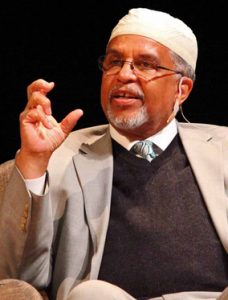Imam Plemon El-Amin: Interfaith Cooperation Requires Sincere and Open Engagement
 “O Humankind! We created you from a single male and female, and made you into nations and tribes that you may come to know one another. Surely the most honored among you in the sight of God is the most righteous of you.” -Qur’an 49:13
“O Humankind! We created you from a single male and female, and made you into nations and tribes that you may come to know one another. Surely the most honored among you in the sight of God is the most righteous of you.” -Qur’an 49:13
This verse is often cited by Muslims as a scriptural incentive to engage in interfaith dialogue and exchange. The conception is that we all come from a single pair of parents and from that common origin, in time, we develop into diverse and distinct tribes, ethnicities, races, nations, and religions. The verse states that the purpose of these differences is to inspire us to know one another, and it also implies that through knowing the other we come to better know ourselves. It is important to note that it further states that our superiority is not found in our race, color, ethnicity, or nationality, but in our righteousness.
During my 40 years of active interfaith engagement, dialogue, and collaboration, the most consistent and intriguing outcome from cross-faith exchanges has been participants thinking more deeply and seriously about their own religious beliefs, practices, and traditions. As I learn about your faith, I reflect upon my own. As I come to know you, I see myself and my possibilities more clearly.
Religious diversity is a given today. In Atlanta, we cross paths at work, at the mall, in restaurants, and on the sidewalks with Muslims, Jews, Hindus, Buddhists, Sikhs, Zoroastrians, members of the Bahá’í faith, and Christians of various denominations. Tolerance is not enough as a skill or virtue for interfaith encounter, nor does tolerance necessarily nullify ignorance, stereotypes, half-truths, or fears. Interfaith requires sincere and open engagement and/or relationship. It is not relativism, we do not leave our faith identities or commitments behind. Nor can we have hidden agendas. We must be honest, trusting, and trustworthy, seeking to know a good in common that we can’t know alone or within the limitations of our comfort zones. It requires conscious effort, thought, and deep regard for truth, decency, and humanity.
The Parliament of World Religions offers a Declaration Towards A Global Ethic:
“In the face of all humanity, our religious and ethical convictions demand that every human being must be treated humanely. Every person, without any distinction, has an inalienable and untouchable dignity. And every human is obliged to behave in a genuinely human fashion, to do good and avoid evil.”
This is the spirit and belief that calls me to sign, promote, and embrace the Atlanta Interfaith Manifesto. Adding my name to the list of diverse yet intrinsically connected individuals must also obligate me and each of them to live upon the higher values of faith, interfaith, and this Manifesto.
Dr. Martin Luther King, Jr. said “Human progress is neither automatic nor inevitable…every effort towards the goal of justice requires sacrifice, suffering, and struggle. Without persistent effort, Time itself becomes an ally of the insurgent and primitive forces of irrational emotionalism and social destruction. This is no time for apathy or complacency, this is a time for vigorous and positive action.”
Dr. King’s words capture why the Atlanta Interfaith Manifesto is necessary and important now. The alarming escalation of hate speech, religious intolerance, xenophobia, and racial fears, calls us to respond and take a stand for peace, freedom, equality, and decency. Apathy and complacency are suicidal in this present environment. The Manifesto is a covenant that must evolve into a social contract of civility and justice among the signers and hopefully throughout our City, State, and Nation. Following further insightfulness of Dr. King, on one hand, this Manifesto attempts to touch or change the souls of the individual signers so that society may be changed, and on the other hand, it is attempting to change the society so that individual souls will have a chance.
May our hearts be engaged, our minds enlightened, our souls expanded, our relationships broadened, our commitment deepened, our city beloved, and our humanity fulfilled. Amin
-Imam Plemon T. El-Amin
Plemon T. El-Amin is the Imam Emeritus of the Atlanta Masjid of Al-Islam, one of the largest and most progressive Mosques in the U.S. He is the former Director of the Clara Mohammed Elementary School and W. Deen Mohammed School of Atlanta. Working as a close aide and supporter of Imam Warith Deen Mohammed, Imam El-Amin has traveled the nation and the world, representing the concerns and interests of Muslim Americans and Interfaith adherents in such places as Palestine, Sudan, Saudi Arabia, Israel, Syria, Jordan, Denmark, England, Spain, Egypt, Turkey, Malaysia and South Africa.
Imam Plemon El-Amin serves on various religious and civic councils, including Interfaith Community Initiatives, the Boards of the Faith Alliance of Metro Atlanta, the Atlanta Majlis Ash Shura, the Atlanta Interfaith Broadcasters, the World Pilgrims, and the Atlanta Fulton County Recreation Authority.
